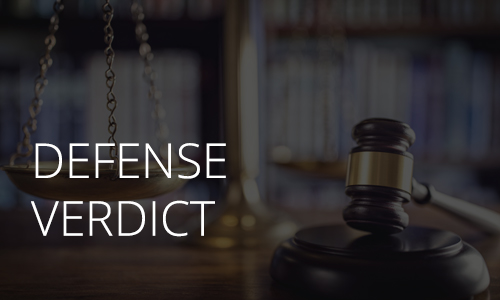Our claims management team obtained a defense verdict on behalf of two pediatricians and their limited liability corporation in a case involving an alleged delay in the diagnosis of a large symptomatic meningioma in a 9-year old boy requiring surgery and causing alleged postoperative neurological deficits.
The patient followed at the defendants’ pediatric practice since birth. At the age of five, a complaint of headache was documented in the EMR with a diagnosis of “viral illness”. Three years later, on 11/21, the mother brought her son to the pediatrician complaining that he had flat feet. She requested a referral to podiatry. The mother also noted that her son had a headache. Two days later, the mother called the office at 5 p.m. complaining that her son’s headache continued and that her son had a ‘fainting episode’. She requested that he refer her son to a specialist. The following day was Thanksgiving, and the pediatrician advised the mother to either have the patient come to the office in 2 days or take her son to the ED. Two days later, the mother brought her son to the office. The mother reported that the boy had fainted at a babysitter’s house and was trembling afterward but now felt better. The pediatrician diagnosed questionable seizure disorder and ordered an EEG. The patient was seen again in January. The EEG was normal, and the pediatrician concluded that the episode was a transient syncopal event.
On 6/21 the mother returned to the office with her son. She informed the pediatrician that he had gone to the hospital after having a seizure while at a swimming pool. He was discharged from the hospital for outpatient neurological evaluation. No imaging was performed. The pediatrician referred the patient to neurology. Six weeks later, the patient was seen by a neurologist who ordered an MRI of the brain which demonstrated an 8x4x8cm predominately intraventricular mass extending from the left lateral ventricle into the left frontal to parietal lobes. He underwent neurosurgical resection of the meningioma. The family of the patient brought suit against both pediatricians alleging a failure to diagnose and treat an intra-ventricular neoplasm with obstructive hydrocephalus requiring the need for a more extensive surgery and resulting in post-operative neurological impairment.

At trial, the plaintiff’s attorney attempted to make the case that the mother of the patient had repeatedly contacted the pediatricians involved to report persistent headaches. The attorney argued that despite these prolonged symptoms, coupled with loss of
consciousness, the pediatricians involved failed to order an imaging study. Furthermore, the plaintiff’s attorney argued, had an MRI been ordered in a more timely fashion, the patient would have had a less extensive surgery and a reduced neurologic sequelae.
In response to the plaintiff’s case, the defense was able to show that the story told by the plaintiff was not borne out by the medical record which had only one telephone communication about headache. Further, a review of the EMR showed that neurological examinations were performed at the visits and that they were all normal. Defense experts testified that had the tumor been detected at the time the plaintiff alleges it ought to have been, the neurosurgeon would have had to perform a similar surgery and would have to traverse the same brain regions which are alleged to have been injured in this case. Evidence was produced by the defense revealing that despite the stated injuries, the plaintiff had returned to 95% normal strength, was playing sports competitively with other fully-abled children and was performing well in school.
Upon review of the evidence, the jury was able to deduce that the case put forth by the defense more accurately reflected the actual events, and therefore, they returned a verdict in favor of the pediatricians and their limited liability corporation.
**Although the disposition of this claim predates the formation of EmPRO, the management of the claim was handled by EmPRO’s management company (PRIMMA, LLC). To learn more about the EmPRO story, click here.
